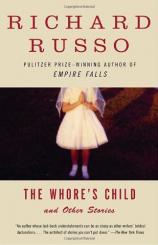Excerpt
Excerpt
The Whore's Child: Stories

Sister Ursula belonged to an all but extinct order of Belgian nuns who conducted what little spiritual business remained to them in a decrepit old house purchased by the diocese seemingly because it was unlikely to outlast them. Since it was on Forest Avenue, a block from our house, I'd seen Sister Ursula many times before the night she turned up in class, but we never had spoken. She drove a rusted-out station wagon that was always crowded with elderly nuns who needed assistance getting in and out. Though St. Francis Church was only a few blocks away, that was too far to walk for any of them except Sister Ursula, her gait awkward but relentless. "You should go over there and introduce yourself someday," Gail, my wife, suggested more than once. "Those old women have been left all alone." Her suspicion was later confirmed by Sister Ursula herself. "They are waiting for us to die," she confessed. "Impatient of how we clutch to our miserable existences."
"I'm sure you don't mean that," I said, an observation that was to become my mantra with her, and she, in turn, seemed to enjoy hearing me say it.
She appeared in class that first night and settled herself at the very center of the seminar despite the fact that her name did not appear on my computer printout. Fiction writing classes are popular and invariably oversubscribed at most universities, and never more so than when the writer teaching it has recently published a book, as I had done the past spring. Publishing the kind of book that's displayed in strip-mall bookstores bestows a celebrity on academic writers and separates them from their scholar colleagues, whose books resemble the sort of dubious specialty items found only in boutiques and health food stores. I'd gotten quite a lot of press on my recent book, my first in over a decade, and my fleeting celebrity might have explained Sister Ursula's presence in my classroom the first chilly evening of the fall semester, though she gave no indication of this, or that she recognized me as her neighbor.
No, Sister Ursula seemed innocent not only of me but also of all department and university protocol. When informed that students petition to take the advanced fiction writing class by means of a manuscript submission the previous term, and that its prerequisites were beginning and intermediate courses, Sister Ursula disputed neither the existence nor the wisdom of these procedures. Nor did she gather her things and leave, which left me in an odd position. Normally it's my policy not to allow unregistered students to remain in class, because doing so encourages their mistaken belief that they can wheedle, cajole or flatter their way in. In the past I'd shown even football players the door without the slightest courtesy or ceremony, but this was a different challenge entirely. Sister Ursula herself was nearly as big as a linebacker, yet more persuasive than this was her body language, which suggested that once settled, she was not used to moving. And since she was clearly settled, I let her stay.
After class, however, I did explain why it would be highly unprofessional of me to allow her to remain in the advanced fiction workshop. After all, she freely admitted she'd never attempted to write a story before, which, I explained, put her at an extreme disadvantage. My mistake was in not leaving the matter there. Instead I went on. "This is a storytelling class, Sister. We're all liars here. The whole purpose of our enterprise is to become skilled in making things up, of substituting our own truth for the truth. In this class we actually prefer a well-told lie," I concluded, certain that this would dissuade her.
She patted my hand, as you might the hand of a child. "Never you mind," she then assured me, adjusting her wimple for the journey home. "My whole life has been a lie."
"I'm sure you don't mean that," I told her.
In the convent, Sister Ursula's first submission began, I was known as the whore's child.
Nice opening, I wrote in the margin, as if to imply that her choice had been a purely artistic one. It wasn't, of course. She was simply starting with what was for her the beginning of her torment. She was writing–and would continue to write–a memoir. By mid-semester I would give up asking her to invent things.
The first installment weighed in at a robust twenty-five pages, which detailed the suffering of a young girl taken to live in a Belgian convent school where the treatment of the children was determined by the social and financial status of the parents who had abandoned them there. As a charity case and the daughter of a prostitute, young Sister Ursula (for there could be no doubt that she was the first-person narrator) found herself at the very bottom of the ecclesiastical food chain. What little wealth she possessed–some pens and paper her father had purchased for her the day before they left the city, along with a pretty new dress–was taken from her, and she was informed that henceforth she would have no use for such pitiful possessions. Her needs–food, a uniform and a single pair of shoes–would be provided for her, though she would doubtless prove unworthy to receive them. The shoes she was given were two sizes too small, an accident, Sister Ursula imagined, until she asked if she might exchange them for the shoes of a younger girl that were two sizes too large, only to be scorned for her impertinence. So before long she developed the tortured gait of a cripple, which was much imitated by the other children, who immediately perceived in her a suitable object for their cruelest derision.
The mockery of her classmates was something Sister Ursula quickly accommodated, by shunning their companionship. In time she grew accustomed to being referred to as "the whore's child," and she hoped that the children would eventually tire of calling her this if she could manage to conceal how deeply it wounded her. During periods of recreation in the convent courtyard she perfected the art of becoming invisible, avoiding all games and contests when, she knew, even those on her own team would turn on her. What she was not prepared for was the cruelty she suffered at the hands of the nuns, who seemed to derive nearly as much satisfaction from tormenting her as their charges–beginning with her request to exchange shoes. She had not merely been told that this was not permitted, but was given a horrible explanation as to why this was so. The chafing of the too small shoes had caused her heels to bleed into her coarse white socks and then into the shoes themselves. Only a wicked child, Sister Veronique explained, would foul the shoes she'd been given with her blood, then beg to exchange them for the shoes of an innocent child. Did she think it fair, the old nun wondered out loud, that another child, one who had not only a virtuous mother but also a father, be asked to wear the polluted shoes of a whore's child?
Worse than the sting of the old nun's suggestion that anything Sister Ursula touched immediately became contaminated was the inference that trailed in the wake of her other remark. The innocent girl had not only a virtuous mother–Sister Ursula knew what this meant–but also a father, which seemed to imply that she herself didn't have one. Of course she knew that she did have a father, a tall, handsome father who had promised to rescue her from this place as soon as he could find work. Indeed, it was her father who had brought her to the convent, who had assured Mother Superior that she was a good girl and not at all wicked. How then had Sister Veronique concluded that she had no father? The young girl tried to reason it through but became confused. She knew from experience that evil, by its very nature, counted for more in the world than good. And she understood that her mother's being a prostitute made her "the whore's child," that her mother's wickedness diminished her father's value, but did it negate his very existence? How could such a thing be? She dared not ask, and so the old nun's remark burrowed even deeper, intensifying a misery that already bordered on despair.
Sister Ursula's first installment ended here, and her fellow students approached the discussion of it as one would an alien spacecraft. Several had attended Catholic schools where they'd been tutored by nuns, and they weren't sure, despite my encouragement, that they were allowed to be critical of this one. The material itself was foreign to them; they'd never encountered anything like it in the workshop. On the plus side, Sister Ursula's story had a character in it, and the character was placed in a dire situation, and those were good things for stories to do. On the other hand, the old nun's idiom was imperfect, her style stiff and old-fashioned, and the story seemed to be moving forward without exactly getting anywhere. It reminded them of stories they'd heard other elderly people tell, tales that even the tellers eventually managed to forget the point of, narratives that would gradually peter out with the weak insistence that all these events really did happen. "It's a victim story," one student recognized. "The character is being acted on by outside forces, but she has no choices, which means there can be no consequences to anything she does. If she doesn't participate in her own destiny, where's the story?"
Not having taken the beginning and intermediate courses, Sister Ursula was much enlightened by these unanticipated critiques, and she took feverish notes on everything that was said. "I liked it, though," added the student who'd identified it as a victim story. "It's different." By which he seemed to mean that Sister Ursula herself was different.
The old nun stopped by my office the day after, and it was clear she was still mulling the workshop over. "To be so much . . . a victim," she said, searching for the right words, "it is not good?"
"No," I smiled. Not in stories, not in life, I was about to add, until I remembered that Sister Ursula still wasn't making this distinction, and my doing so would probably confuse her further. "But maybe in the next installment?" I suggested.
She looked at me hopefully.
Excerpted from The Whore's Child © Copyright 2003 by Richard Russo. Reprinted with permission by Random House. All rights reserved.
The Whore's Child: Stories
- paperback: 240 pages
- Publisher: Vintage
- ISBN-10: 0375726012
- ISBN-13: 9780375726019



